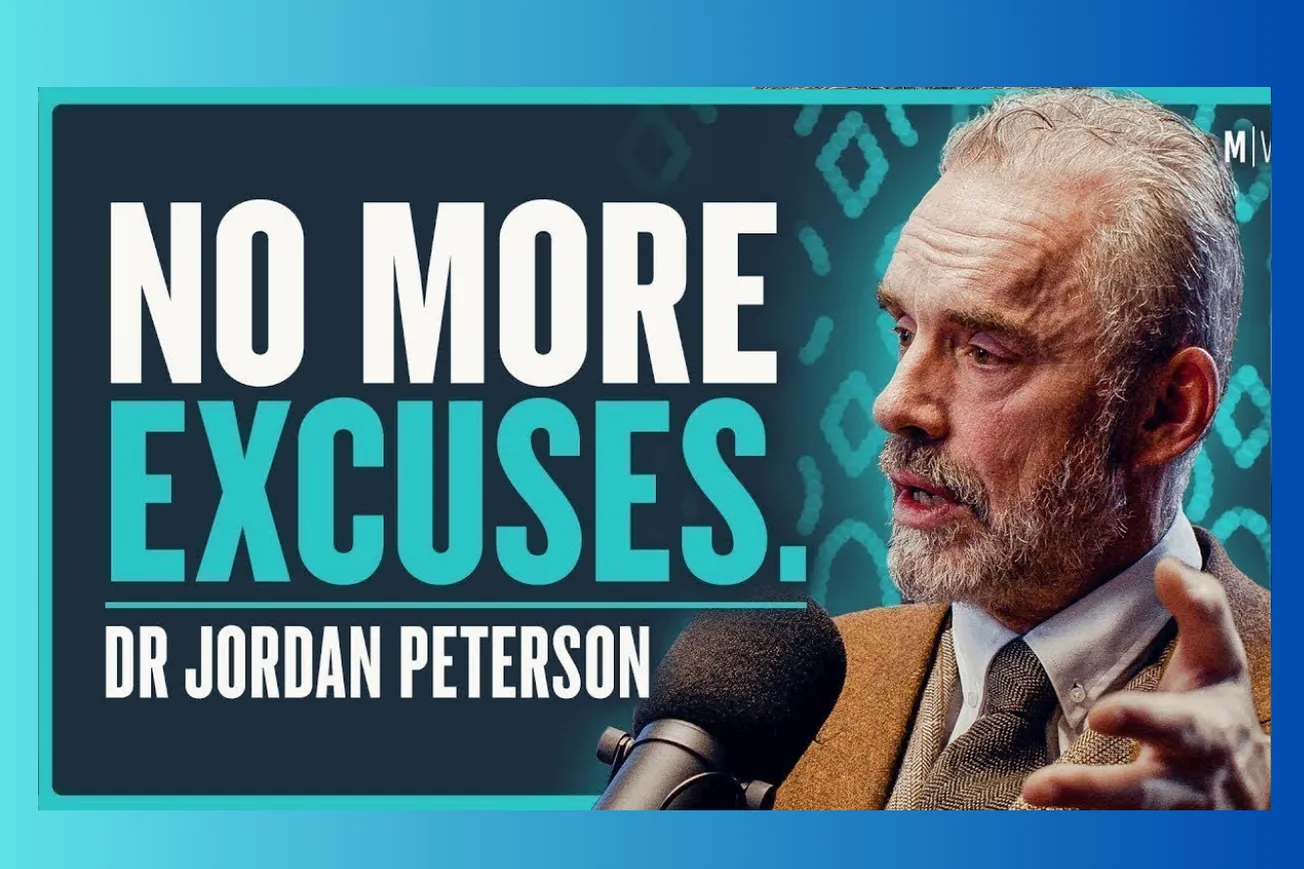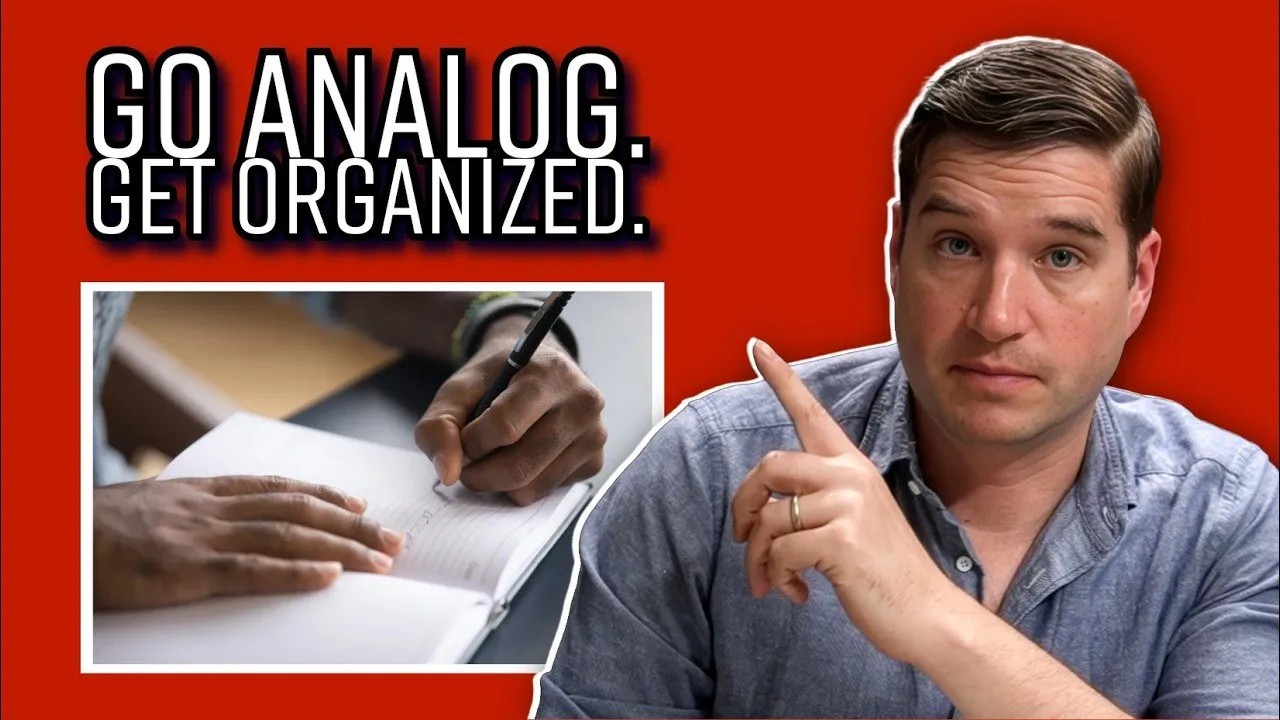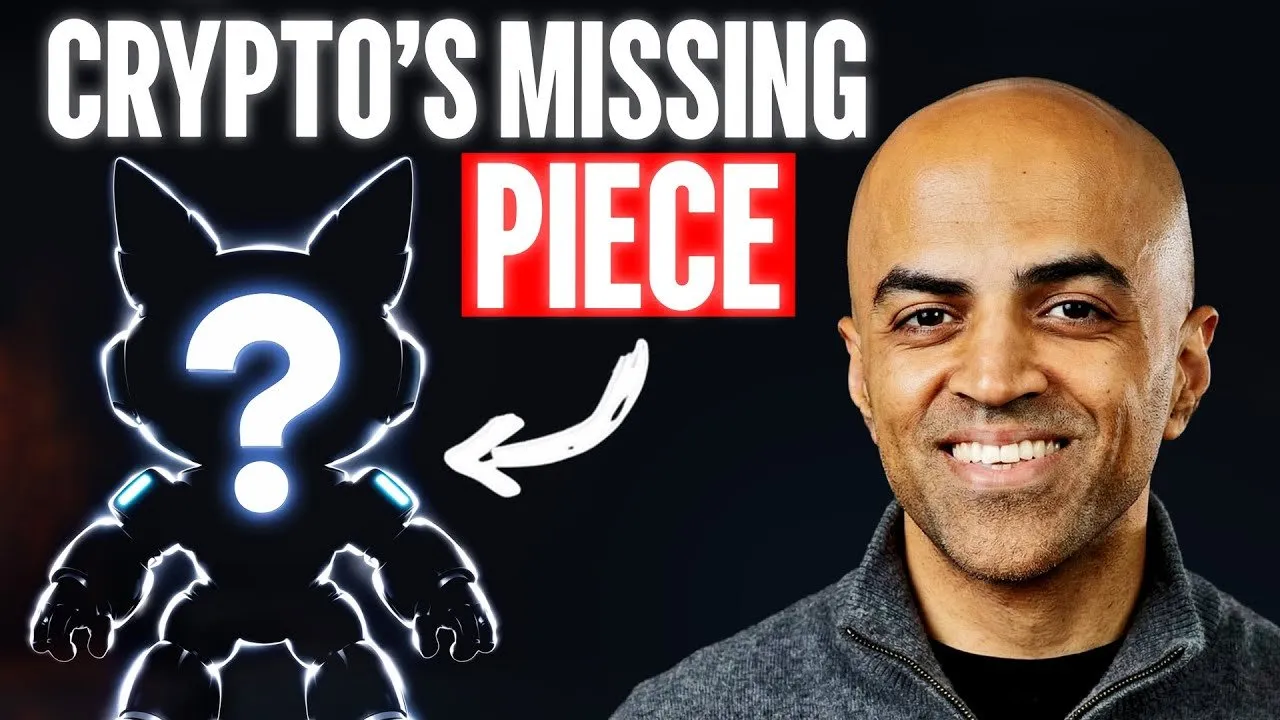Table of Contents
Clinical psychologist Jordan Peterson reveals why the greatest battle you'll ever fight isn't against external circumstances, but against the self-sabotaging forces within your own mind—and how to win that war.
Key Takeaways
- The ultimate predator isn't external threats but the enemy you harbor in your own heart that actively works against your success
- Modern culture systematically lies to young women about career priorities, creating a crisis of unfulfilled expectations by age 30
- Population collapse, not overpopulation, represents the real existential threat facing developed nations within 50 years
- Enforced monogamy refers to cultural norms supporting committed relationships, not government distribution of partners
- Imposter syndrome is healthy evidence of mental competence—everyone moving upward feels like an impostor because they're beginners
- Becoming "dangerous" through verbal competence and articulation provides the most formidable competitive advantage available
- Truth in service of love means pursuing what's best for everyone's flourishing rather than crafting predetermined outcomes
- Committing fully to one difficult pursuit teaches you how to bring all your disparate energies together in a unified direction
- Zero-cost systems create perverse incentives and devalue genuine effort—proper pricing signals both quality and commitment
- The spiritual battle against evil is fundamentally internal, not sociological, requiring constant vigilance against self-betrayal
Timeline Overview
- 00:00–01:48 — Intro: Peterson opens with the concept of the ultimate predator being the self-destructive enemy within your own heart
- 01:48–06:13 — Jordan's Thoughts on Elon Musk: Meeting at Tesla factory, why courage isn't developed through protection, and the theatrical genius of shooting a car into space
- 06:13–12:12 — Is Identity Confusion a Psychological Epidemic?: Gender identity confusion as psychological contagion affecting thousands, parallels to satanic daycare scares of the 1980s
- 12:12–17:10 — The Modern Dating Market: Hypergamy in university settings, sex ratio hypothesis effects, and the misunderstood concept of "enforced monogamy"
- 17:10–30:32 — Over 50% of Women are Childless at 30: How culture systematically lies to young women about life priorities, the biological reality vs career messaging
- 30:32–38:48 — Should We Worry About Population Collapse?: Why developed nations face precipitous population decline, the anti-human sentiment driving birth rate collapse
- 38:48–48:02 — How to Overcome Complacency: Why comfort becomes sedation, the necessity of adventure and excellence over mere absence of suffering
- 48:02–56:38 — Dealing with Imposter Syndrome: Why feeling like an impostor indicates mental health, the developmental necessity of acting beyond current competence
- 56:38–1:05:30 — How to Make Yourself More Dangerous: Verbal competence as the ultimate weapon, how rap and hip-hop demonstrate articulate power
- 1:05:30–1:16:39 — Jordan's Recovery & Tour: Emerging from illness, the wedding-like atmosphere of his lectures, and connecting with 150,000 people seeking meaning
- 1:16:39–1:25:00 — Is it Possible to Take on Too Much Responsibility?: Balancing infinite responsibility with delegation, avoiding the narcissism of believing everything depends on you
- 1:25:00–1:33:25 — Truth in the Service of Love: How genuine dialogue emerges when you pursue truth without predetermined outcomes, letting the wind blow where it will
- 1:33:25–1:41:31 — The Usefulness of an Enemy: Why internal adversaries are better than external ones, the spiritual battle that must be fought within
- 1:41:31–1:48:25 — The Consequences of Blue-sky Vision: Comparing American optimism with British tall poppy syndrome, the demographic shift in child-rearing
- 1:48:25–1:59:32 — Why Pursuing Excellence is Terrifying: The necessity of committing to something difficult, using temporal limits to create beneficial constraints
- 1:59:32–2:08:35 — Repercussions of Zero-Costing: How free systems create perverse incentives, the importance of proper pricing as quality signals
- 2:08:35–end — Conclusion: Final thoughts on the individual as the proper level of analysis for meaningful change
The Ultimate Predator: The Enemy Within
Key Quote: "What's the ultimate predator? What's the enemy you harbor in your own heart who hates you? That's the ultimate predator."
Peterson's most profound insight cuts through layers of external blame to identify the real source of human misery: self-sabotage. While people focus on external predators—snakes, hostile tribes, betraying friends—the most dangerous enemy is the internal voice that actively works against your success and happiness.
This isn't about low self-esteem or lack of confidence. It's about recognizing the part of yourself that whispers "start tomorrow" when you decide to make positive changes, that suggests shortcuts when you should do the work, that chooses familiar suffering over unfamiliar growth. This internal predator knows exactly how to undermine you because it has intimate access to all your weaknesses and rationalizations.
Elite Insight: "How about when you betray yourself? Oh yeah... that's the ultimate predator."
The Christian tradition's association of the serpent in Eden with Satan represents this psychological insight: the ultimate evil isn't external but internal. The snake represents the part of human nature that chooses immediate gratification over long-term flourishing, that prefers comfortable lies to difficult truths.
This internal battle requires different weapons than external conflicts. You can't negotiate with self-sabotage or appease it. The only solution is developing the courage to consistently choose what's difficult but right over what's easy but destructive. This means keeping commitments to yourself even when no one else is watching, especially when no one else is watching.
The Systematic Deception of Young Women
Key Quote: "We just lie to them all the time... the first lie is there's nothing more important than your career... the second lie is there will be nothing more important to you in your life than your career... the third lie is there should be nothing more important in your life than your career."
Peterson's clinical observation spans decades of watching high-achieving women reach their late twenties and experience a profound psychological transformation. Despite cultural messaging that career should be paramount, the vast majority of women around age 29-30 begin prioritizing family formation over professional advancement.
This creates a tragic mismatch between cultural promises and biological reality. Society tells young women they can "have it all" without acknowledging the brutal time constraints involved. Fertility declines significantly after 30, yet women are encouraged to spend their peak reproductive years climbing corporate ladders.
Elite Insight: "I worked with high-end lawyers in Toronto for about 10 years... these were women who were generally very attractive, well put together physically, pretty stable psychologically, extremely conscientious, very very smart and high achieving... all the law firms, all the women bailed out, all of them."
The law firm example illustrates this pattern at the highest levels. These weren't women lacking opportunity or ambition—they were the most successful practitioners in one of the most demanding fields. Yet when given the choice between partnership track and family formation, they consistently chose family.
The cultural response to this data point reveals the depth of ideological commitment over empirical observation. Rather than adjusting messaging to match reality, society doubles down on career-first narratives while shaming women who prioritize motherhood. This creates unnecessary suffering for individual women and demographic catastrophe for society.
Population Collapse: The Real Existential Threat
Key Quote: "I've thought for at least 10 years that the biggest problem in 50 years will be that there's just not enough people."
While environmental activists promote anti-natalist messaging, demographic data reveals a looming population catastrophe. Developed nations have fallen well below replacement fertility rates, creating an inverted age pyramid that threatens economic and social stability.
The psychological dimension matters as much as the statistical one. Peterson identifies a "deeply rooted existential self-hatred" driving the "there are too many people" narrative. This represents what he calls the "mephistophelian stance"—the belief that existence is so corrupt it would be better if it were annihilated.
Elite Insight: "There's no sentiment more implicitly genocidal than that statement [the planet has too many people]... what do you mean too many people exactly and what do you mean the planet and what do you propose to do about that exactly?"
The anti-natalist position contains logical contradictions that reveal its ideological rather than empirical basis. People promoting population reduction rarely volunteer to reduce themselves. Instead, they advocate for others to limit reproduction while maintaining their own right to exist and reproduce.
This mindset represents a fundamental rejection of human potential and dignity. Rather than viewing each person as a unique individual capable of contributing value to the world, anti-natalism treats humans as an undifferentiated mass consuming resources. Peterson argues this perspective abandons the core Western principle of individual sovereignty.
The Truth About "Enforced Monogamy"
Key Quote: "One human universal is the construction of societies to both mandate and reward monogamy... it's because it's the best long-term solution fundamentally, but one of the reasons for that is that when women are scarce, men get violent."
Peterson's comments about "enforced monogamy" generated massive controversy due to deliberate misinterpretation. He wasn't advocating government distribution of women to men—a position so absurd it bears no relationship to anything any sane person has ever proposed.
Instead, he was describing an anthropological universal: all human societies develop cultural norms supporting monogamous pair bonding. This "enforcement" comes through social approval of fidelity and mild disapproval of promiscuity, not through legal coercion.
Elite Insight: "The punishing is that there's moral disapproval applied to say cheating right, to adultery, to especially running around behind your partner's back... but that's not the only type of enforcement, it's not the only type of sanction."
The confusion around "enforcement" reveals how politicized discussion of social norms has become. Cultural enforcement operates through the full spectrum of social feedback—approval, disapproval, shame, pride, inclusion, exclusion. This isn't authoritarianism but the basic mechanism by which all societies maintain beneficial behaviors.
Monogamous norms serve both individual and collective interests. For individuals, they provide emotional security and stable environments for child-rearing. For society, they prevent the violence that emerges when large numbers of men have no realistic prospects for forming families.
Imposter Syndrome as Mental Health Indicator
Key Quote: "Everyone with any sense who isn't narcissistic feels that [imposter syndrome] and it's actually an indication of your mental health and your competence as long as that doesn't become crippling."
Peterson reframes imposter syndrome from pathology to natural consequence of growth. When you transition to a new level of responsibility or expertise, you literally are an impostor because you're a beginner in that role. Feeling like you don't belong yet indicates accurate self-assessment, not psychological dysfunction.
The alternative to imposter syndrome is either stagnation (never attempting anything challenging) or narcissism (believing you deserve positions you haven't earned). Healthy people experience temporary discomfort when stretching beyond their current competence level.
Elite Insight: "Every great man is an actor of his own ideal... if you want to move to the next stage at some point you have to act like you're already there when you're just barely started and that's not a lie."
This connects to Nietzsche's insight about becoming who you are. Growth requires projecting yourself into roles you haven't fully grown into yet. This isn't deception but aspiration—you act the part until you become the part.
The key is distinguishing between healthy imposter syndrome and crippling self-doubt. Healthy imposter syndrome motivates competence development. Crippling self-doubt prevents engagement altogether. The solution isn't eliminating the feeling but learning to act despite it.
Becoming Dangerous Through Verbal Mastery
Key Quote: "There's nothing that makes you more formidable than verbal competence, than being able to articulate, be able to think, to marshal your arguments... some battlefield metaphor to get everything in order, get all your information straight, know to marshal your forces."
Peterson identifies verbal competence as the ultimate competitive advantage, particularly for young men who often struggle with traditional educational approaches. The ability to think clearly, argue persuasively, and articulate complex ideas transcends physical limitations and provides unlimited battlefield applications.
This explains the appeal of rap and hip-hop to disaffected youth. These genres demonstrate verbal prowess at the highest levels—complex rhyme schemes, improvisation, wordplay, and storytelling that requires extraordinary mental agility. Young people recognize and respect this competence even when they can't replicate it.
Elite Insight: "That's part of the reason that rap artists are so popular especially among disaffected young men black and white alike because they're unbelievably articulate... they have this incredible verbal prowess, it's unbelievably attractive."
The comedy club example reinforces this point. A physically unimpressive comedian commanded the room through pure verbal skill—improvising an eight-minute rap incorporating random audience suggestions while maintaining rhyme and thematic coherence. This demonstration of logos (the creative word) captivated everyone present.
Verbal competence serves as both weapon and tool. In conflicts, it allows you to defend yourself and advance your position without resorting to physical violence. In collaboration, it enables you to contribute value, solve problems, and build relationships. In personal development, it forces you to clarify your thinking and organize your mental life.
Truth in Service of Love
Key Quote: "What you're doing by engaging in truthful dialogue is letting the wind blow where it's going to blow... you do that if you've decided at some fundamental level that the truth will set you free and the truth is what is in the final analysis redemptive."
Peterson's highest principle combines rigorous truth-seeking with genuine care for human flourishing. This isn't truth as abstract information but truth as a process that emerges through authentic dialogue aimed at what's best for everyone involved.
The "service of love" component prevents truth from becoming cruel or nihilistic. The goal isn't proving yourself right but discovering what's actually true in service of what would be best for all parties. This requires genuine care for the other person's wellbeing, not just their agreement with your position.
Elite Insight: "I come to the conversation [thinking] I'm going to try to have the most engaging conversation that I can have... I'm not trying to craft an outcome, I don't know what we're going to talk about... whatever we accomplish in the course of a genuine dialogue is for the best."
This approach requires what Peterson calls "letting go of the tiller"—releasing control over outcomes and trusting that truth-seeking dialogue will lead somewhere worthwhile. This doesn't mean being passive but rather being genuinely open to changing your mind when presented with better information or reasoning.
The practice demands tremendous courage because you must be willing to discover that your cherished beliefs are wrong. But this vulnerability creates the possibility for genuine growth and connection. When both parties commit to truth over being right, conversations become adventures rather than battles.
The Necessity of Internal Enemies
Key Quote: "If you need something to grapple with... you can find that, you just look inside you'll find something to grapple with... inadequacy, weakness, susceptibility to temptation, narcissism, pride, envy, revenge, resentment, frustration, lack of faith."
Peterson advocates for internalizing the adversarial relationship rather than seeking external enemies. While external conflicts can provide motivation, they're ultimately less reliable and more dangerous than internal battles against your own limitations and vices.
The internal enemy is always available and perfectly matched to your current level. Unlike external adversaries who may be too weak (providing no growth) or too strong (being overwhelming), your internal challenges scale appropriately with your development.
Elite Insight: "The external one battle between good and evil on a playing field of chaos and order, that's the eternal game... but part of what the religious enterprise is about... is the notion that that sacred battle is fundamentally spiritual... it's to be fought on the battleground of the soul internally."
This connects to the broader theme of taking responsibility for what you can control. You can't control external circumstances or other people's behavior, but you can work on your own character defects and moral failings. This work is both more reliable and more rewarding than external crusades.
The spiritual dimension matters because it elevates the struggle beyond mere self-improvement to participation in the fundamental structure of reality. The battle between good and evil is real, but it primarily plays out in the human heart rather than in political or social movements.
Commitment as Liberation
Key Quote: "You can change course as long as the next thing you do is equally or more difficult... you want to discipline yourself so you can get yourself organized so that you can go in a particular direction so that when you find the right direction you can really go in that direction."
Peterson's rule about commitment prevents using "growth" or "finding yourself" as excuses for avoiding difficulty. The principle that any course change must involve equal or greater challenge eliminates the temptation to quit when things get hard.
This creates a beneficial constraint that forces you to develop genuine competence rather than just sampling different experiences. By committing to see something through regardless of initial enthusiasm, you learn what you're actually capable of achieving.
Elite Insight: "You want to commit to something and then when you commit to something you require yourself to bring all of your disparate components moving in a single direction... it's a unifying act."
The unification aspect is crucial. Most people remain scattered across multiple interests and obligations, never bringing their full capacity to bear on anything significant. Commitment forces integration of all your energies toward a single purpose.
This doesn't mean limiting yourself to one pursuit forever. Rather, it means learning how to coordinate all your faculties toward a shared goal. Once you develop this capacity through sustained commitment, you can apply it to subsequent challenges with much greater effectiveness.
Dr. Jordan Peterson's advice cuts through contemporary confusion to address fundamental human challenges. His insights about internal enemies, the importance of truthful dialogue, and the necessity of commitment provide a framework for navigating life's difficulties without succumbing to victimhood or nihilism. The ultimate message is both sobering and hopeful: while you cannot control external circumstances, you have far more power over your internal state and responses than most people realize. The battle for meaning and fulfillment must be fought where it can actually be won—within your own character and choices.
Practical Implications
• Identify Internal Self-Sabotage: Recognize when the voice saying "start tomorrow" or suggesting shortcuts is your internal enemy working against your stated goals
• Commit to Difficult Pursuits: Choose at least one challenging endeavor and commit to seeing it through regardless of fluctuating motivation or enthusiasm
• Develop Verbal Competence: Invest serious effort in improving your ability to think clearly, argue persuasively, and articulate complex ideas accurately
• Practice Truth-Seeking Dialogue: Enter conversations genuinely willing to change your mind rather than simply trying to prove your existing positions correct
• Accept Imposter Syndrome: Understand that feeling like you don't belong in new roles indicates healthy self-awareness, not psychological dysfunction
• Focus Internal Rather Than External Battles: When you need an adversary for motivation, look to your own character defects rather than demonizing other people or groups
• Apply Equal Difficulty Standards: If you must change course from commitments, ensure the new direction involves equal or greater challenge to prevent backsliding
• Recognize Anti-Human Messaging: Question cultural narratives that promote population reduction or frame human existence as fundamentally problematic
• Support Monogamous Norms: Understand that cultural support for committed relationships benefits both individuals and society without requiring government coercion
• Price Things Appropriately: Recognize that zero-cost systems often create perverse incentives—proper pricing signals both quality and genuine value





